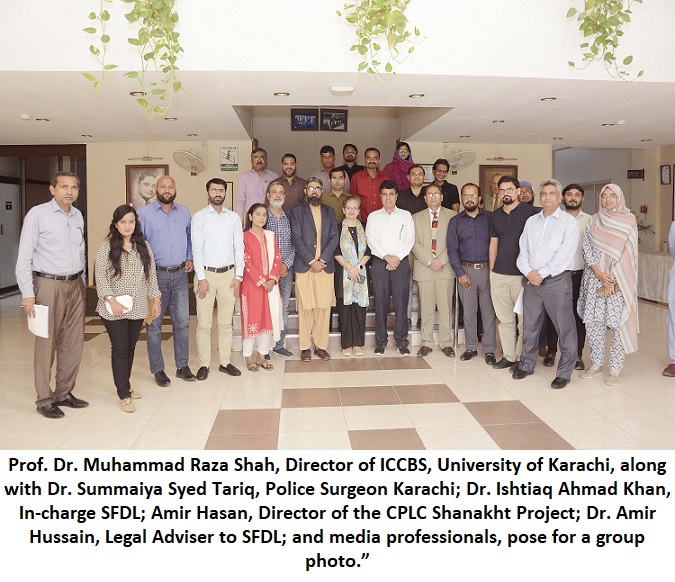Media professionals from various beats — including education, science, crime, and health — participated in a one-day training session titled “Forensic DNA Awareness Session for Media Professionals,” organized by the Sindh Forensic DNA and Serology Laboratory (SFDL) at the International Center for Chemical and Biological Sciences (ICCBS), University of Karachi, on Thursday.
The session aimed to enhance participants’ understanding of the technical and ethical aspects of forensic DNA reporting, promoting accurate, responsible, and informed media coverage of DNA-related cases.
The training was jointly organized by SFDL, ICCBS, University of Karachi, and the Education Reporters Association Karachi, with active participation from representatives of the Health Reporters Association (HRA) and the Crime Reporters Association Karachi.
Prof. Dr. Muhammad Raza Shah, Director of ICCBS; Dr. Sumaiya Syed Tariq, Police Surgeon Karachi; Dr. Ishtiaq Ahmad Khan, In-charge and Project Director of SFDL; Amir Hasan, Director of the CPLC Shanakht Project; and Dr. Amir Hussain, Legal Adviser to SFDL, addressed the participants.
In his inaugural speech, Prof. Dr. Muhammad Raza Shah welcomed the participants and emphasized the importance of collaboration between DNA laboratories and media professionals, noting that this relationship is crucial for ensuring accurate, ethical, and responsible communication of scientific information to the public. He also highlighted the growing significance of forensic DNA analysis and its implications for the judicial system. He said that since its establishment, SFDL has played a vital role in responding to major disasters and high-profile criminal cases.
Dr. Ishtiaq Ahmad Khan underlined the importance of training media professionals in reporting DNA-related cases. He said DNA evidence often plays a key role in criminal investigations, paternity cases, and disaster victim identification, and the way this information is presented in the media can strongly influence public perceptions of justice and science. He added that media professionals rely on DNA experts to explain complex scientific findings accurately and understandably, while close cooperation helps prevent misinformation and exaggerated claims in news coverage. He informed participants that the laboratory has produced high-quality forensic reports for over 9,500 cases, covering a broad range of DNA and serology investigations.
Dr. Sumaiya Syed Tariq spoke about media ethics, noting that ethical health reporting requires journalists to receive adequate training in health reporting ethics to fully understand the responsibility of their role and to cooperate with health authorities to ensure the responsible dissemination of information. She emphasized that reports should be factual, use precise language, and avoid speculation or unsubstantiated claims.
The inaugural session concluded with a vote of thanks delivered by Dr. Syed Jafar Askari, Media Advisor at ICCBS. In the end, a comprehensive panel discussion was also held.
Report by : Zulfiqar Ali Magsi

